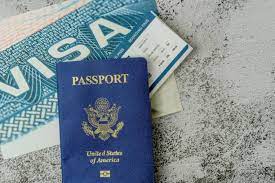EU raises security concerns as it reveals five Caribbean states have sold 88,000 ‘golden passports’

Brussels: The EU has raised security concerns about the trade in “golden passports” and vowed to tighten visa controls after revealing five Caribbean states have sold citizenship to 88,000 individuals from countries including Iran, Russia and China.
A report published by the European Commission sets out for the first time the true scale of the Caribbean passport trade. A number of countries sell citizenship to foreign nationals, with prices starting at $100,000 (£82,326) a head.
Dominica, an island with a population of just over 70,000, has issued 34,500 passports, the report claimed. The number is more than four times the total previously disclosed by Dominica’s government. St Kitts and Nevis, with a population of 48,000, has issued 36,700 passports, twice as many as estimated up to 2018.
Five Caribbean states – Antigua and Barbuda, Grenada, St Kitts and Nevis, St Lucia and Dominica – have issued 88,000 passports between them.
The announcement follows publication of Dominica: Passports of the Caribbean, an investigation by the Guardian and other media organisations in partnership with the Organized Crime and Corruption Reporting Project (OCCRP), which examined Dominica’s citizenship by investment scheme in unprecedented detail.
The sale of passports in Dominica surged after 2015 when citizens of a number of Caribbean states were given permission to travel to most EU member states for 90 days a year without a visa. St Kitts reached agreement on visa-free travel with the EU in 2009. Overall, the EU has visa-free travel agreements with 60 countries.
The commission is proposing to overhaul regulations, saying it is concerned golden passports could be enabling the “infiltration of organised crime, money laundering, tax evasion and corruption”. It wants the power to suspend visa exemption for countries that sell citizenship to buyers who do not have a “genuine link” to the country.
Under the terms of Dominica’s scheme, buyers do not need to have a home there or even visit the country.
In a proposal asking the European parliament to enact new legislation, the commission said: “The EU should have the possibility to suspend the visa exemption for a third country that chooses to operate an investor citizenship scheme whereby citizenship is granted without any genuine link to the third country concerned.”
The commission said those who acquired a second citizenship were being allowed to change names and identities. Such practices could impede border controls and the enforcement of sanctions or Interpol arrest warrants.
The EU home affairs commissioner, Ylva Johansson, said: “We have countries within the visa-free regime with the EU that are selling passports/citizenships quite cheaply to people that are security risks or potential security risks to the EU.
“They are sometimes allowed to change their names and identity several times after getting the new citizenship, and of course this is also security risks for the EU that we have to look into.”
Johansson also raised concerns around migration, telling reporters that 150,000 passengers had used the visa-free travel arrangements to get into the EU and then claim asylum. “This is of course not how the visa-free travelling should be used,” Johansson said.
The report said the rejection rate for applications to Dominica and St Kitts and Nevis was “extremely low (between 3% and 6%), which, together with the short processing times (as little as two months in some cases), raises questions as regards the thoroughness of the security screening”.
It also raised concerns around the nationalities of golden passport holders, saying most applicants came from China and Russia, Syria, Iran, Iraq, Yemen, Nigeria and Libya – all countries that have high levels of perceived corruption.
“Visa-free access to the EU should not be used as a commercial commodity to be sold and bought,” the report said.
Margaritis Schinas, the European Commission vice-president who is coordinating the migration changes, said the rules needed “sharpening” with a list of “new reasons to suspend visas”.
Visa-free travel has benefited Europe by increasing tourism and business travel, but it needed “to make sure that our visa policy framework is not misused”, Schinas added.
Dominica has published the names of 7,700 people who received citizenship by investment (as well as other routes such as marriage) between 2009 and 2018. However, analysis of budget data by the Guardian and OCCRP suggested that 19,000 may have become citizens between 2016 and 2022. The EU data suggests that even that estimate is 80% below the true figure.
Dominica has not responded to detailed questions on its scheme. However, the prime minister, Roosevelt Skerrit, defended the sale of passports in two press conferences held after being approached for comment, describing the background checks on applicants as “robust”, with candidates undergoing “layers of due diligence”. He also likened reporters to “terrorists” and arsonists.
Visa-free travel to countries such as the EU and US is one of the key benefits advertised by Caribbean citizenship by investment schemes. Any threat to that privilege could directly affect native-born Dominican citizens, as happened in July when the UK withdrew visa-free travel from its former colony, citing “clear and evident abuse of the scheme, including the granting of citizenship to individuals known to pose a risk to the UK”.





